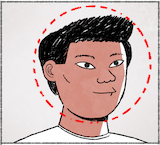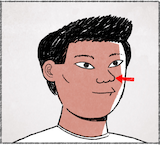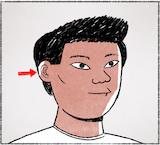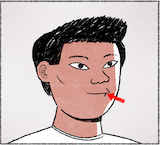



นี้คืออี่หยัง อันนี้กะเป็นหัวเนาะ เป็นลูบหัวของคน อันนี้กะเป็นหัวของคนเนาะ
หัวของคนกะมีส่วนปะกอบหลายสิ่งหลายอย่างอยู่ในหัวนั้น มีหูแน่ มีตาแน่ มีปากแน่ มีดังแน่เนาะ แต่ละอย่างกะใซ้คนละแบบออกไปเนาะ
หูกะเอาไว้ถ้าฟัง ตากะเอาไว้ถ้าเบิ่ง ปากกะเอาไว้ถ้ากินเข้า หลือว่าเอาไว้ถ้าเว้า ดังกะเอาไว้ถ้าหายใจ หลือว่าไว้ดมกิ่นอี่หยังเนาะ
แล้วกะมีอีกหลายสิ่งหลายอย่างที่อยู่ในหัวของเฮา หลือว่าอยู่ในใบหน้าของเฮา ที่เฮาบ่ได้เอ่ยฮอด หลือว่าบ่ได้เว้าฮอดเนาะ
15
นี้คืออี่หยัง อันนี้เป็นดัง อันนี้เป็นดังของคน
ดังของคนเอาไว้เฮ็ดหญัง ดังของคนกะเอาไว้หายใจ หลือว่าเอาไว้ดมกิ่น
ขั้นคนบ่มีดังกะบ่สามาดหายใจได้ หลือว่าบ่สามาดหันใจได้เนาะ กะสิตายนั้นแล้ว ขั้นคนบ่มีดัง แม่นบ่
กะอีกอย่างหนึ่ง ดังกะเอาไว้ถ้าดมกิ่น หลือว่าเอาไว้ดมสิ่งต่างๆ เนาะ กะสามาดฮู้ได้ว่า กิ่นนั้นมันหอม หลือว่ากิ่นนั้นมันเหม็น หลือว่ากิ่นนั้นมันคาว เฮากะสิสามาดฮู้ได้เนาะ
16
นี้คืออี่หยัง อันนี้คือหู อันนี้เป็นหูของคน
คนซู่คนต้องมีหู ขั้นบ่มีหูกะสิบ่ได้ญิน
นอกจากว่าคนหูหนวก เขาจั่งสิบ่ได้ญิน แต่ว่าหูคนปกกะติกะสิได้ญิน ได้ญินพุนั้นเว้า ได้ญินพุนี้เว้า ได้ญินเสียงอันนั้น ได้ญินเสียงอันนี้เนาะ
17
นี้คืออี่หยัง อันนี้คือปาก อันนี้เป็นปากของคน
คนซู่คนกะต้องมีปาก หลือว่าสัดทุกโตกะต้องมีปาก
ปากเอาไว้เฮ็ดหญัง ปากกะเอาไว้ถ้าเว้า หลือว่าเอาไว้ถ้ากินนั้นกินนี้ เอาไว้ถ้าเว้าอันนั้นเว้าอันนี้
คนซู่คนต้องมีปากแล้วกะเว้าได้ นอกจากว่าคนปากกืก หลือว่าคนใบ้เนาะ สิเว้าบ่มีเสียง สิบ่สามาดเว้าออกมาได้ แต่ว่าคนซู่คนสิสามาดเว้าได้ หลือว่าเว้ามีเสียงเนาะ เอาไว้เว้าอันนั้น เว้าอันนี้ หลือว่าเว้าพื้นคนเนาะ
Link to overview page
Link to dictionary
| Isaan | Pronunciation | Tones | Thai | English/Notes |
|---|---|---|---|---|
| นี้ | ni: | HF | นี้ | 1. this 2. here |
| คือ | khʉ: | HR | คือ | 1. to be, to resemble, like, as 2. why {บักหล้าคือบ่เก็บโต่ะแน่ = [addressing a young boy] Why haven't you cleared the table?} |
| อี่หยัง | i:-yaŋ | H-M | อะไร | 1. what {นี้คืออี่หยัง = What is this?} {มื้อนี้เจ้าเฮ็ดอี่หยัง = What are you doing today?} {กินเข้างายกับอี่หยัง = What did you have for breakfast?} 2. something, anything, (in negations) nothing {บ่ต้องเฮ็ดอี่หยังอีกเลยนอกจากใส่ปุย = [we] don't need to do anything besides adding fertilizer} |
| อัน | an | M | อัน | 1. thing, object 2. general clf. for objects |
| กะ | ga | M | ก็ | 1. then, consequently 2. also |
| เป็น | pen | M | เป็น | 1. to be, to exist 2. to be able to 3. to suffer, sth. happens to 4. เป็นหญัง[...]คือ in initial position: why? {เป็นหญังเขากะคือแปงฟัน = Why is he brushing his teeth?} {เป็นหญังเคี่ยงบินมันคือสิตก = Why is the airplane falling down?} |
| หัว | hu:a | M | หัว | 1. head 2. clf. for onions, bulbs of garlic |
| เนาะ | nɔ | H | เนาะ | final particle: makes the statement softer, looking for agreement |
| ลูบ | lu:p | HF | รูป | 1. picture, image, photo 2. form, shape 3. clf. for pictures, images, photos |
| ของ | khɔ:ŋ | M | ของ | of, belonging to |
| คน | khon | HR | คน | person, people |
| มี | mi: | HR | มี | 1. to have 2. there is |
| ส่วนปะกอบ | su:an-pa-gɔ:p | H-M-LF | ส่วนประกอบ | component, element |
| หลายสิ่งหลายอย่าง | la:i-siŋ-la:i-ya:ŋ | M-H-M-H | หลากหลาย, มากมาย, หลายอย่าง | varied, various, several (kinds etc.) |
| อยู่ | yu: | H | อยู่ | 1. to be (located) at 2. yet, still 3. auxiliary indicating continuous or progressive action {ทอดปาอยู่ในกะทะ = (in the process of) frying a fish in the pan} {แม่กำลังเมี้ยนเฮียนอยู่ = mother is cleaning/tidying up the house} |
| ใน | nai | HR | ใน | in, within |
| นั้น | nan | HF | นั้น | that, there |
| หู | hu: | M | หู | 1. ear 2. opening, hole, e.g., the hole a needle has to insert the thread 3. handle which has a hole, e.g., of a cup or pot |
| แน่ | nɛ: | H | แน่, บ้าง | 1. some, somewhat 2. final particle, used to ask for examples (similar to Thai บ้าง at the end of a question) {หม้อใซ้เฮ็ดอี่หยังได้แน่ = What (different things) can a pot be used for?} {น้ำอัดลมซื้อได้อยู่ใสแน่ = Where/in which places can one buy soft drinks?} 3. final particle, when giving examples {มีเทิงส้งแน่ มีเสี้ยแน่ มีเกิบแน่ = there are trousers, shirts, shoes etc.} 4. final particle, used to give a command {ไปปิดหน้าต่างให้แน่ = Close the window!} 5. final particle, acting as an intensifier, especially in the pattern ... คัก ... แน่ {สูงคักสูงแน่ = very high} {ญ้องเฮาคัก ญ้องเฮาแน่ = [he's] praising me a lot} |
| ตา | ta: | M | ตา | eye {เขามีตาสองข้าง = he's got two eyes} {หลับตา = to close one's eyes} |
| ปาก | pa:k | LF | ปาก | mouth |
| ดัง | daŋ | M | จมูก | nose |
| แต่ละ | tɛ:-la | H-H | แต่ละ | each {มือแต่ละข้างกะสิมีห้านิ้ว = each hand has five fingers} {แต่ละมื้อๆ = each day} |
| อย่าง | ya:ŋ | H | อย่าง | type, kind, sort, category |
| ใซ้ | sai | HF | ใช้ | to use |
| คนละ | khon-la | HR-H | คนละ | different, in a different manner {ไก่กับหมา เลี้ยงคนละแบบ = chicken and dogs are raised differently} {อยู่คนละปะเทด = [they] are in different countries} {คนละแบบ = different(ly), in a different manner} |
| แบบ | bɛ:p | LF | แบบ | 1. example, model, kind 2. style, form, pattern, design |
| ออก | ɔ:k | LF | ออก | 1. to go out, to leave 2. out |
| ไป | pai | M | ไป | 1. to go 2. auxiliary indicating action extending into the future |
| เอา | ao | M | เอา | to take, to give {เขากำลังเอาก่องไปซั่ง = he's taking the boxes to weigh them} {หมอกำลังเอายาให้คนป่วยกิน = the doctor is giving medicine to the patient} {เอาไว้ถ้า = is for, is used for, has the purpose of} |
| ไว้ถ้า | wai-tha: | HF-LF | usually in a positive statement or answer: is for, is used for, has the purpose of {กะทะมีไว้ถ้าทอด = a pan is for frying} {น้ำบักนาวมีไว้ถ้าปุงอาหาน = lime juice is used to season food} {ปากกามีไว้ถ้าเขียน = a pen is for writing} {กะเทียมเอาไว้ถ้าเฮ็ดแนวกิน = garlic is used to make food} {ขาเอาไว้ถ้าญ่าง = legs are for walking} {เกิบเอาไว้ถ้าใส่ = shoes are for wearing} Notes: see also ไว้ |
|
| ฟัง | faŋ | HR | ฟัง | to listen, to hear |
| เบิ่ง | bəŋ | H | ดู | 1. to look at, to see, to watch {เบิ่งโทละทัด = to watch TV} {เบิ่งหนัง = to watch a movie} 2. to guess {เบิ่งซงแล้ว ... = [I] guess / from what it looks like ...} |
| กิน | gin | M | กิน | to eat, to consume, to use |
| เข้า | khao | LF | ข้าว | rice {กินเข้า = to eat} {ปูกเข้า, เฮ็ดเข้า = to grow/plant rice} {เกี่ยวเข้า = to harvest rice} {กับเข้า = courses eaten with rice} |
| หลือ | lʉ: | M | หรือ | or |
| ว่า | wa: | H | ว่า | 1. that, as {คำว่า X = the word X} 2. to say |
| เว้า | wao | HF | พูด | to say, to speak, to talk |
| หายใจ | ha:i-jai | M-M | หายใจ | to breathe |
| ไว้ | wai | HF | ไว้ | 1. to keep, to put, to place, to retain, to save, to reserve {เขาเอาหัวของเขาไว้ใส = Where does she put her head?} {หมาสิเลี้ยงไว้บ้าน = dogs are kept/raised in the house} {ไก่เลี้ยงไว้ในคอก = chicken are kept/raised in a coop} {หน้ามันบังไว้ = the face is covered/not visible} {เขาเอาโทละสับวางไว้หู = he holds the phone to his ear} 2. for {นาลิกาปุกมีไว้เฮ็ดหญัง = What is an alarm clock for?} {หม้อเอาไว้เฮ็ดแนวกิน = a pot is used to make food} {ก่องเอาไว้เฮ็ดหญัง ก่องเอาไว้ใส่ของ = What is the box for? It's for putting in stuff.} Notes: see also ไว้ถ้า |
| ดม | dom | M | ดม | to smell, to sniff {ดมกิ่นดอกไม้ = to smell the scent of flowers} |
| กิ่น | gin | H | กลิ่น | smell, scent, odour {ดมกิ่น, ได้กิ่น = to smell} |
| แล้ว | lɛ:o | HF | แล้ว | 1. finished 2. already 3. and then, and next (especially แล้วกะ) 4. auxiliary for past tense |
| อีก | i:k | LF | อีก | 1. more, again 2. other, another |
| ที่ | thi: | H | ที่ | 1. that, which {คนที่ยืนอยู่ฝั่งขวา = the person which is standing on the right = the person standing on the right} {เว้าคำที่บ่สุพาบ = to speak words which are impolite = to speak impolitely} 2. for ordinal numbers {ที่สาม = third} |
| เฮา | hao | HR | เรา | 1. personal pronoun: we 2. personal pronoun: I |
| ใบหน้า | bai-na: | M-LF | ใบหน้า | face |
| บ่ | bɔ: | H | ไม่ | 1. no, not 2. question particle, transforming a statement into a question Notes: spelling exception in line with common usage on social media |
| ได้ | dai | HF | ได้ | 1. can 2. to get, to obtain 3. before verb: indicating past tense 4. บ่ได้ + verb: not |
| เอ่ย | ə:i | H | เอ่ย | to say, to speak, to utter |
| ฮอด | hɔ:t | HF | ถึง | 1. to arrive, to attain {ฮอดจุดหมายปายทาง = (airplane, train etc.) to arrive at one's destination} {มันทันได้ฮอดหกโมงอยู่ = it's not yet 6 o'clock} 2. to, at {ผมญาวฮอดบ่าไหล่เอาโลด = long hair down to the shoulders} 3. about {บ่ได้เว้าฮอด = [I] haven't talked about [this]} {คนที่เฮาเว้าฮอดวั่งหั้นหละ = the person we've just talked about} |
| เฮ็ด | het | H | ทำ | to do, to make |
| หญัง | ɲaŋ | M | อะไร, เป็นหญัง = ทำไม | 1. what {เขากำลังเฮ็ดหญัง = What is he doing?} {ธูปเอาไว้เฮ็ดหญัง = What are incense sticks for?} 2. something, anything, (nothing) 3. เป็นหญัง[...]คือ in initial position: why {เป็นหญังเขาคือใส่บักพิกลงไปในกวยเตียว = Why is he putting chili in [his] noodle soup?} {เป็นหญังหน้าต่างมันคือเปิด = Why is the window open?} {เป็นหญังมันคือมีควนไฟ = Why is there smoke?} |
| ขั้น | khan | LF | เมื่อ | when, if |
| สามาด | sa:-ma:t | M-HF | สามารถ | can, to be able |
| หันใจ | han-jai | M-M | หายใจ | to breathe |
| สิ | si | M | จะ | future tense auxiliary {เขากำลังสิตื่น = he's about to wake up} {สิไปตะหลาด = [I'm] going to the market} |
| ตาย | ta:i | M | ตาย | to die |
| แม่นบ่ | mɛ:n-bɔ: | H-H | ใช่ไหม | question particle: ..., right? ..., isn't it? ..., don't you? etc. {เจ้าได้เห็นสิ่งนั้นแม่นบ่ = You've seen that, haven't you?} {ฝนกำลังตกแม่นบ่ = It's raining, isn't it?} {นี้คือกะคุแม่นบ่ = This is a bucket, isn't it?} |
| หนึ่ง | nʉŋ | H | หนึ่ง | 1. one 2. after adjective: intensifier {บักคักหนึ่ง = very much} {อันบักใหญ่หนึ่ง = very large}, or attenuates the meaning {กะดาดมันแผ่นน้อยๆ หนึ่ง = the piece of paper is [relatively] small} |
| สิ่ง | siŋ | H | สิ่ง | thing, object |
| ต่างๆ | ta:ŋ-ta:ŋ | H-H | ต่างๆ | different, various |
| ฮู้ | hu: | HF | รู้ | 1. to know 2. to understand Notes: equivalent to ลู้ |
| มัน | man | HR | มัน | it (also used to refer to people) |
| หอม | hɔ:m | M | หอม | to smell good, to be fragrant |
| เหม็น | men | M | เหม็น | to smell, to stink |
| คาว | kha:o | HR | คาว | fishy, stinking |
| ซู่ | su: | H | 1. all, entire 2. every, any {ซู่พุซู่คน = everybody} {ซู่สิ่งซู่อย่าง = everything} {ไก่ต้องกินเข้าซู่มื้อ = chicken need to eat every day} {ซู่คนสิมีขาเอาไว้ถ้าญ่าง = everybody has legs to walk} |
|
| ต้อง | tɔŋ | HF | ต้อง | to have to, must |
| ได้ญิน | dai-ɲin | HF-HR | ได้ยิน | to hear |
| นอกจาก | nɔ:k-ja:k | HF-LF | นอกจาก | except, besides, apart from, other than |
| หูหนวก | hu:-nu:ak | M-LF | หูหนวก | deaf, to be deaf |
| เขา | khao | M | เขา | personal pronoun: he, she |
| จั่ง | jaŋ | H | ค่อย (?) | then, afterwards {ต้องใซ้น้ำมันพ้อม มันจั่งสิทอดได้ = one needs to use oil as well, then one can fry [food]} |
| แต่ว่า | tɛ:-wa: | H-H | แต่ว่า | 1. but 2. only {ฮู้แต่ว่าเขายืนอยู่พุเดียว = I only know that he's standing there by himself} |
| ปกกะติ | pok-ga-ti | M-M-M | ปกติ | 1. normal, usual 2. normally, usually |
| พุ | phu | H | ผู้ | 1. person 2. clf. for people {พุหญิงพุหนึ่ง พุซายพุหนึ่ง = a woman, a man} {ซู่พุซู่คน = everybody} {พุหนึ่งโตจ่อยๆ พุหนึ่งโตบักอ้วนหนึ่ง = one person is slim, the other is fat} Notes: pronunciation: also realized as พู่- |
| เสียง | si:aŋ | M | เสียง | 1. sound, noise 2. tone, voice |
| สัด | sat | M | สัตว์ | animal |
| ทุก | thuk | H | ทุก | every Notes: also pronounced ทุ as in ทุมื้อๆ = everyday, always |
| โต | to: | M | ตัว | 1. body, self 2. clf. for animals, characters/letters/consonants, appliances, clothes (e.g., pairs of trousers, shirts) |
| ปากกืก | pa:k-gʉ:k | LF-LF | ใบ้ | mute |
| ใบ้ | bai | HF | ใบ้ | mute |
| มา | ma: | HR | มา | 1. to come 2. auxiliary expressing action towards the present or focal time {กะคุเฮ็ดมาจากอี่หยัง = What is the bucket made of?} {แล้วเขากะเก็บเงินจากพุนั้นมา = and then she takes the money of that person} |
| เว้าพื้น | wao-phʉ:n | HF | นินทา | to gossip, to talk about other people |